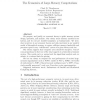Free Online Productivity Tools
i2Speak
i2Symbol
i2OCR
iTex2Img
iWeb2Print
iWeb2Shot
i2Type
iPdf2Split
iPdf2Merge
i2Bopomofo
i2Arabic
i2Style
i2Image
i2PDF
iLatex2Rtf
Sci2ools
112
click to vote
IPL
1998
1998
The Economics of Large-Memory Computations
We propose, and justify, an economic theory to guide memory system design, operation, and analysis. Our theory treats memory random-access latency, and its cost per installed megabyte, as fundamentals. We introduce incentives in our economic theory, and side-constraints in our analytic model of hierarchical memory, to ensure sucient memory bandwidth and processor speed in any \well-formed" system of a given latency and size. Our theory suggests that computer users should be charged a \rental" cost, proportional to their use of the total capacity in a hierarchical memory system. This rental cost is a natural unit for algorithmic analysis and, we submit, is a rational basis for pricing. We use our theory to compare the cost/performance of various largememory organizations such as PoPCs (\piles of PCs"), NOWs (\networks of workstations"), SMPs (\shared memory multiprocessors"), MPPs (\massively parallel processors"), and even Cray-class vector supercomputer...
Related Content
| Added | 22 Dec 2010 |
| Updated | 22 Dec 2010 |
| Type | Journal |
| Year | 1998 |
| Where | IPL |
| Authors | Clark D. Thomborson |
Comments (0)

